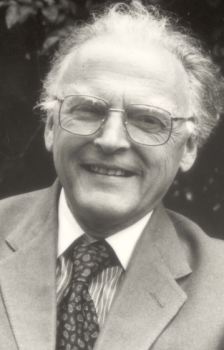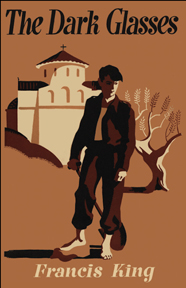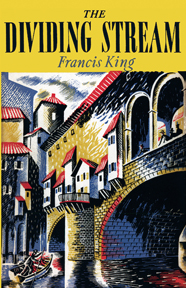|
BOOK DETAILS
Trade paper ISBN-13: 978-1941147351 List Price: $16.99 U.S. Pages: 212 Published: 2014 |
The Man on the Rock (1957)
Francis King With a new introduction by Gregory Woods Due to copyright restrictions, this title is only available to customers in the U.S. and Canada.
Book Description
Spiro Polymerides is a con artist, petty thief, and parasite who survives only by means of his youthful beauty and natural cunning. Restlessly, he drifts from one victim to another: Irvine Stroh, an American relief worker and repressed homosexual; Helen Bristow, a wealthy, middle-aged widow; and Kiki, the young daughter of a Greek shipping magnate. As he exploits, betrays, and ultimately destroys each of the people who love him, Spiro will come to find that the final victim is himself . . . The Man on the Rock (1957) was the seventh novel by the prolific Francis King (1923-2011), who was hailed by Beryl Bainbridge as ‘one of our great writers, of the calibre of Graham Greene and Nabokov’. One of King’s most popular and best-reviewed novels, it returns to print in this edition, which features a new introduction by Gregory Woods. |
reviews
‘A skilful, confident tale of modern Greece ... brilliantly successful ... There is indeed no fault to find with this book.’ – David Williams, Guardian
‘Mr. King is masterly ... he is exact, moving and funny ... a very enjoyable book.’ – Angus Wilson, The Observer
‘Constructed with unobtrusive mastery ... has the quality of readability which can only be achieved by the highest type of professional skill.’ – Francis Wyndham, The Spectator
‘Serious, skilful, intelligent.’ – Times Literary Supplement
‘Mr. King is masterly ... he is exact, moving and funny ... a very enjoyable book.’ – Angus Wilson, The Observer
‘Constructed with unobtrusive mastery ... has the quality of readability which can only be achieved by the highest type of professional skill.’ – Francis Wyndham, The Spectator
‘Serious, skilful, intelligent.’ – Times Literary Supplement
ALSO AVAILABLE THROUGH ONLINE RETAILERS
MORE TITLES BY THIS AUTHOR
AUTHOR BIOGRAPHY

Francis King was born in Switzerland in 1923 and spent the first eight years of his life in India before being sent back to England to a boarding school. A bright student, he earned a Classics scholarship to Balliol College, Oxford, but later changed to English literature, and published his first novel, To the Dark Tower (1946) while still an undergraduate. This novel, and his next two, Never Again (1947) (an autobiographical novel based on King’s childhood) and An Air That Kills (1948), were published by Home and Van Thal, which then went bankrupt, but not before King had established himself as a promising young novelist.
Beginning in 1949, King worked for the British Council and travelled extensively, including to Italy, Greece, and Japan, all of which would provide settings for his novels. His next book, The Dividing Stream (1951), set in Florence, won the Somerset Maugham Award and cemented King’s status as one of the bright young literary stars of his generation. During the 1950s and 60s, King published a string of excellent works, including The Dark Glasses (1954), The Man on the Rock (1957), The Widow (1957), The Custom House (1961), and The Waves Behind the Boat (1965).
In 1966, King resigned from the British Council to devote himself to writing full-time and supplemented his income by writing book and theatre reviews and working as a literary adviser to the publishing house of Weidenfeld & Nicolson.
He continued to write prolifically, and notable highlights include the gay-themed novel A Domestic Animal (1970), which drew a threat of a libel action, The Action (1978), which narrowly missed the Booker shortlist, and Act of Darkness (1983), which, unlike many of King’s books—which were always well-received critically—was relatively successful commercially.
King went on writing until his death in 2011, making the Booker longlist with The Nick of Time (2003) and publishing a revised 60th anniversary edition of An Air That Kills with Valancourt Books in 2008; his final novel, Cold Snap, appeared in 2010.
Beginning in 1949, King worked for the British Council and travelled extensively, including to Italy, Greece, and Japan, all of which would provide settings for his novels. His next book, The Dividing Stream (1951), set in Florence, won the Somerset Maugham Award and cemented King’s status as one of the bright young literary stars of his generation. During the 1950s and 60s, King published a string of excellent works, including The Dark Glasses (1954), The Man on the Rock (1957), The Widow (1957), The Custom House (1961), and The Waves Behind the Boat (1965).
In 1966, King resigned from the British Council to devote himself to writing full-time and supplemented his income by writing book and theatre reviews and working as a literary adviser to the publishing house of Weidenfeld & Nicolson.
He continued to write prolifically, and notable highlights include the gay-themed novel A Domestic Animal (1970), which drew a threat of a libel action, The Action (1978), which narrowly missed the Booker shortlist, and Act of Darkness (1983), which, unlike many of King’s books—which were always well-received critically—was relatively successful commercially.
King went on writing until his death in 2011, making the Booker longlist with The Nick of Time (2003) and publishing a revised 60th anniversary edition of An Air That Kills with Valancourt Books in 2008; his final novel, Cold Snap, appeared in 2010.






